
November 7-9, 2007, Toulouse, France
|
|
|
[ download call for papers, pdf file ] - [ scope ] - [ submissions ] - [ tracks ]
The focus of TAMODIA2007 are notations used to describe user tasks ranging from textual and graphical forms to formal descriptions and even interactive, multimodal and multimedia tools. Submissions are equally welcome from those studying notations and modeling frameworks themselves, or the ways in which these fit within the interaction design process.
Scope
We seek high-quality, original papers that address the theory, design, development and evaluation of ideas, tools, techniques, methodologies in (but not limited to) the following topics:
- Task Analysis
- Processes and methods
- Task Modeling
- Application Domains
- Interaction Techniques
-
Understanding opportunistic, dynamically planned on-the-fly activities, and non-planned activities
Participatory role of the user in task elicitation
Verification and validation of task models
Properties of tasks
-
Early requirements for task-based design
Task-based design
Integration of task analysis and task modeling with software engineering
Integration of task analysis and task modeling with user centered design
Derivation of UI from task models: systematic processes and methods
-
Analytical and empirical task modeling
Cognitive task models
Notations and tools for task modeling
-
Task analysis and task models for critical systems
Task analysis and task models for e-commerce and e-government
Task analysis and task models for collaborative systems
Task analysis and task models for complex or exceptional tasks
The role of task analysis in modeling leisure, entertainment, creative activities or experiences
-
Task models for multimodal interaction
Task models for augmented and virtual reality
Submission guidelines
Papers in all categories will appear in the conference proceedings. They should be written in English and adhere to the Springer LNCS (Lecture Notes in Computer Science) format, as a PDF file.
Papers should be send via the Conference review systems Web site at http://liihs.irit.fr/tamodia/submission/.
Tracks
Scientific papers (up to 14 pages) should present high quality, original work within the topics of the conference. They should highlight general scientific contributions of the research and practical significance.
Industrial/Demo papers (up to 14 pages) can present tools for deadling with task models, case studies demonstratin practical application of Task Modeling and Task Analysis on large scale, and real cases illustrating good practices from. Authors of accepted papers should prepare a poster (A3 format) sumarizing their to be exposed at the conference hall during the demo session.
Student papers (up to 6 pages) offer students and young researchers the opportunity to discuss and to exchange the experience both the work in progress and almost finished dissertations.
Short papers (up to 6 pages) should present preliminary results, reports of work in progress and also overviews of laboratories or groups with significant work within the scope of the workshop.
Last update:







